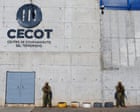
In a world witnessing nuanced challenges, current developments present key discussions surrounding human rights and aid distribution, spotlighting the intricacies of national policies and international humanitarian efforts.
In the United States, Congresswoman Delia Ramirez has initiated a call for a congressional hearing regarding the use of federal funds to El Salvador, aimed at scrutinizing the conditions under which immigrants are detained at the elusive Cecot terrorism prison. The request underscores a broader concern for human rights within detainment facilities, prompting reflections on the ethical use of governmental funds and the care of immigrants transferred since the onset of Donald Trump’s second presidency.
Meanwhile, from New Zealand, Attorney General Judith Collins has voiced caution regarding her government’s proposed electoral reforms, suggesting potential contraventions of human rights laws as a significant concern. The reforms face criticism for possibly disenfranchising the Māori community and altering electoral engagement by imposing prohibitive measures around voter registration and the provision of communal services at polling stations. This unfolds amidst New Zealand’s larger ambition to modernize electoral procedures deemed as outmoded, a move defended by Prime Minister Christopher Luxon, aiming to align governance structures with contemporary realities.
In Australia, a legal debate emerges involving former SBS newsreader Mary Kostakidis, who stands accused of breaching the Racial Discrimination Act by sharing speeches from Hezbollah’s leader. The court examines the tension between free speech and regulatory compliance, providing a context where legal interpretations of racial discrimination and public expressions are interrogated.
Further abroad, Médecins Sans Frontières (MSF) has expressed concerns over the inefficacies of aerial aid drops in addressing the humanitarian crisis in the Middle East, advocating for broader access routes that ensure secure aid delivery. The situation emerges from an ongoing aid blockade by Israel, intended as leverage against Hamas and has since created a stark humanitarian landscape characterized by severe scarcity.
Simultaneously, democratic legislators in the U.S. urge President Trump to cease funding the Gaza Humanitarian Foundation amid accusations that its operations have resulted in civilian casualties and blurred the lines between humanitarian work and military undertakings, flouting established international norms. Led by Senators Chris Van Hollen and Peter Welch, this appeal seeks adherence to historical conventions that separate aid provision from military agendas.
These intertwined narratives contribute to a layered global dialogue on how geopolitical actions intersect with humanitarian ideals, raising continuous questions about the upholding of human rights and compassionate governance within a changing world landscape.
Source: {link}
